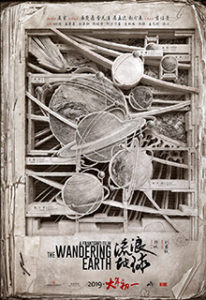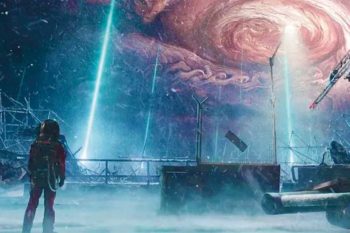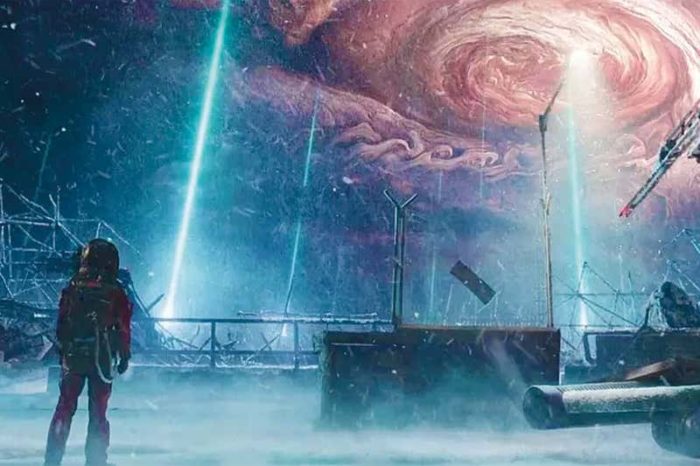The Wandering Earth: Science Fiction From Outside the USA
I watched The Wandering Earth on Netflix and found the Chinese-made film (based on an award-winning novella written by a Chinese author) interesting. Science fiction movies have been made primarily in the USA for a long time and have been exported to the world. Relatively few science fiction stories have come back to the US from other countries. I’m looking at The Wandering Earth as an example of what foreign science fiction may offer the world in the future…though that may be a bit unfair, because this is in fact was only one film, one intended to represent just itself.
Numerous SPOILERS for The Wandering Earth follow, though I will leave some things out about how things take place, in case you decide you want to watch it.
The background of the story is that scientists in the near future discover our sun is showing signs of turning into a red giant. The sun will expand and destroy the Earth. So all the nations on the planet rally together to form “UEG” (United Earth Government), which devotes a massive effort to put colossal engines on the planet that allow first the rotation of the Earth to be stopped and then the entire planet to be moved out of orbit, with the idea of relocating it around a nearby star (which was not named in the movie but probably was Alpha Centauri). Human cities go underground at locations near the massive engines used to push Earth away from the sun as surface temperatures on our planet plummet.

Image Copyright: China Film Group Corporation
Planet Earth is directed towards Jupiter to get a gravity assist from swinging near the gas giant planet on the way out of the Solar System, arriving 17 years after leaving Earth orbit. Planet Earth is proceeded by a massive space station that leads the way for the planet, a space station with a Chinese astronaut (Liu Peiqiang) aboard, who is the father of the story’s main protagonist, Liu Qi, who lives in the underground version of Shanghai.
Liu Qi acquires his grandfather’s driving credentials and takes a giant truck used for mining on the now-exotic surface of the Earth for a joyride, taking with him Han Duoduo, whom his grandfather rescued as a baby girl from the massive tsunami that resulted when Earth’s rotation stopped and who is treated like his adopted sister. The joy ride takes on enormous significance when major earthquakes result from Earth approaching Jupiter, which shuts down a number of its engines, which runs the risk of Planet Earth approaching too close to the gas giant and being destroyed. Liu Qi winds up becoming the driver for a rescue crew who seek to restart the engines that will save Earth.
An important sub-plot is based on MOSS, the computer system that runs the space station flying in the vanguard of Earth (who was rather like HAL 9000 of 2001 A Space Odyssey), dictating that the station should save itself and fly on to the other star on its own. (I’m sure you won’t be surprised to hear that Liu Pieqiang foils the computer’s plans.)
So me, hard science fiction fan that I am, wondered immediately why the planners of this mission didn’t anticipate the earthquakes and why were the engines so easily shut down and why is it that they were approaching so close to Jupiter in the first place, etc. And the solution to this problem they eventually adopted (after the engines didn’t prove to be enough), er, yeah, was pretty terribly dumb. That is, their idea was to ignite Jupiter’s atmosphere, which had absorbed a fair amount of oxygen from the Earth, to cause a shock wave to get Earth back in position–which is SO wrong in so many ways (the explosion would not neatly travel straight back to Earth, even if it did, the nature of an explosion is to deliver a deadly high acceleration punch, and who is to say the unregulated explosion would be enough–or too much, etc, etc).
As already mentioned, I was perhaps unfairly watching this as being symbolic of Chinese (and even foreign in general) science fiction as a whole and was lamenting the fact that plot-induced stupidity seems to be a trick they learned very well from numerous US-made sci fi films. But after watching the movie I read the Wikipedia article on the film and discovered the original novella by Liu Cixin didn’t include such nonsense. For the original story, the main crisis of the tale featured a civil war erupting on Earth based on the idea that UEG had lied to everyone (though they hadn’t). So the original story that inspired the movie was in many ways quite realistic.
So I suppose the Chinese film focused on the more visually dramatic rather than what made sense. This very much happens with US-made films as well, so I didn’t see that as particularly indicative of Chinese or foreign science fiction.
Also similarly to US-made films, the special effects were good, even if a bit overly dramatic at moments. (Though the glimpses of Jupiter’s great spot through the ice storms on Earth’s surface were pretty awesome.)

Image Copyright: China Film Group Corporation
By the way, the film had no graphic violence or nudity, but some swear words appeared in the subtitles.
Note though the story does have some features I doubt you’d see in a US-made film. One example that comes to mind was its willingness to kill off important characters, which US films are usually more reluctant to do.
The movie also features a brief prayer, though obviously one played for a bit of a joke, because the character prays first to Einstein, then to Stephen Hawking, then to Buddha. Still, what was the last US-made sci fi film in which anyone prayed at all?
The film did not turn on its head the common assumption in US-made science fiction that only one language will be spoken in humanity’s future. I mean, US-made movies usually assume everyone speaks English in the future and you might have expected a Chinese-made film to assume everyone speaks Chinese. But no–the story focuses on Chinese characters, so is mostly in Chinese, but even they on a few occasions speak bits of English to one another. Representatives of the UEG speak Chinese but also English and for several important sections of the movie, French. Liu Pieqiang is assisted by a Russian Cosmonaut, Makarov, and weirdly Makarov speaks to Liu in Russian and Liu replies in Chinese and they understand each other just fine. We could say that the Chinese language seems to have a more prominent role in the future world of story than it does in today’s world, but it’s hardly a mirror image of, say, Star Trek in which you’d be lucky to hear even one word of a language other than English spoken by a human character in the tale.
A unique issue related to language was accents: one of the secondary characters from Shanghai had blond hair and said his father is from China and his mother is Australian–and his way of speaking Chinese sounded different to me than everyone else in what must have been an Australian accent that probably was hilarious to Chinese ears. Yet the humor was lost on me. He just sounded different from everyone else.
In fact, one major difference in watching this movie for me was I haven’t watched many Chinese-language films at all. And while I do watch foreign films at times, I’ve studied more than a few world languages and usually have some idea what characters are saying without the subtitles (even in Korean I recognize a little). But I’m clueless in Chinese. I feel I lost a lot of the nuance of the acting by my reliance on the subtitles, though I did appreciate the bits of English and French, and even some of the Russian in the story. But that makes me think of how strange it must be to watch an American film without speaking any English–though in fact, what happens is watchers learn some English by watching English-language movies…
As we all may be learning more Chinese if more movies like The Wandering Earth are made in the future…and I think more such movies will be made. While I doubt they will replace the US film industry, we’re going to see more speculative fiction from outside the United States, most likely…and by the way I would recommend watching this particular movie for all of you reading this, even though I wouldn’t say it was great.
If any of you saw the movie or read The Wandering Earth novella, what are your thoughts on the story? And what do you think about the future of science fiction movies produced outside of the USA?










































Super interesting, Travis. Thanks for sharing! I had bought a book of old Chinese folk tales a while back from a garage sale. Traditional Chinese stories are WEIIIIRRRRD. Traditional folk tales all around the world tend to be weird (just read the original Pinocchio and you’ll see what I mean), but the Chinese ones have a TOTALLY different flavor. I’m fascinated by the culture and how different their worldview is. Will be very interesting to see what they put out in the future.
Side note: while on a 14-hour flight to South Africa, a significant chunk of the movies offered were Chinese-made films, and many legitimately looked interesting. I was told that this is because so many Chinese business people do work in SA, and go to SA to vacation. The world is changing rapidly.
Interesting tidbit about the flight. I had no idea so many Chinese people travelled to SA.
Pinocchio was one book that Disney greatly improved.
Sounds like an interesting movie. I don’t know how practical it would be to move a whole planet that far, but I guess it might have been the only way to ensure there was a dirt/rock based planet available to settle on. From what I’ve heard in documentaries, the effects of a supernova can reach unbelievably far. Were they going far enough that our sun going supernova wouldn’t have affected them? I think it’s neat that the movie was based on a short story, though. I think Arrival was based on a short story, too. Not sure how faithful the movie was to the source material, but the movie was kind of a breath of fresh air since it didn’t care about action and explosions and whatnot. I don’t think it’s a foreign film, but have you seen it?
Anime includes bits of English and other languages, too. It’s fun to see how it’s incorporated. There’s lots of anime sci fi, but when talking about anime, Chinese media and perhaps even K drama stuff, it looks like their fantasy, historical dramas and slice of life gains more traction in foreign countries. Interestingly enough, Brandon Sanderson was talking about how his books sell outside the US, and he said sci fi tends to sell better in Japan, at least in his experience.
I’ve sampled some live action Chinese and Korean dramas on Netflix, and although I like the ideas and stories presented, I’m not so crazy about the acting and such. Some of the mannerisms they have the characters use work better in anime than in live action. But, I’ve read several comics that were either Chinese or Korean (translated into English, of course), and ones based on Chinese and Korean genres, and I’ve liked them quite a bit.
Have you seen this music video?
Well now I’ve seen the video. 🙂
Yeah I’ve observed before that English gets used at least a little in most of the anime I’ve seen…
I haven’t read or watched The Wandering Earth, but I recently watched all 63 (ulp!!!) episodes of Ashes of Love, which is an epic mythological fantasy drama in Mandarin Chinese with English subtitles. I found the mythology and folklore fascinating, as it’s something I’ve had very little exposure to, and while the spiritual beliefs and practices involved were obviously not Christian, I was impressed by the parallels to Biblical teachings when it came to the wages of sin, the soul-poisoning nature of vengefulness and bitterness, and the opportunities it gave even its most seemingly villainous characters to repent. I think I’ll be watching more Asian fantasy and SF drama in future, as it’s a refreshing change of perspective and emphasis from North American fare.
(I should add to anyone interested that while the show starts off with a lot of broad comedy and the acting doesn’t seem all that great, it gets dramatically more serious and the lead actors really get to show their range as the heroine Jinmi grows out of her naive, silly child stage and starts experiencing real hardship and tragedy in her life. At which point you’re riding the Pain Train with these characters all the way to the ending, which proves to be complicated and costly for all involved, but satisfying.)
Thanks for sharing about Ashes of Love. Sounds interesting!
Maybe I’ll be tempted to return to Netflax sooner rather than later. I watched one Korean historical drama and it decided that three-fourths of my recommendations should be Korean rom-coms. There were plenty of big, showy (dumb) fantasy-action flicks (I forget the slang name for that genre), but I rarely feel like watching it.
Im kinda surprised that one of the smaller anime import studios like Sentai Filmworks hasnt tried bringing in Chinese animation.
I also just got done watching the semi-classic Nadia: The Secret of Blue Water. It was pretty meh on the whole, but had dang good sections. It was fun to test my weeb knowledge and see the connections to Laputa, Captain Harlock, and Evangelion. Probably a Gundam or two but i haven’t gotten into Gundam.
Maybe I should read more Liu Cixin, but While The Three Body Problem was interesting, I found it super dry. Also I should learn to pronounce Chinese.
Tapas and Line Webtoon have some Chinese and Korean/inspired comics that are pretty good. I think I Love Yoo is one of them. Great slice of life drama. I think Age Matters is kinda the same deal. Three Lifetimes is a fantasy comic based on Chinese mythology/concepts. And I think Tapas has a K drama collection or something.
Yeah, I feel like I need to study Chinese sometime…
Travis,
Interesting discussion. I would recommend Journey to the West too, which I’m currently (slowly) making my way through. It’s one of the great classics of Asian literature and has had a profound influence on Chinese and Japanese fantasy (Journey to the West can be seen as an early fantasy novel in some sense, at least in its later iterations). The original Dragonball was heavily based on it and Dragonball Z has traces of its influence as well. I do think, however, that China is going to have to ease up on censorship – which is not likely to happen soon – if we are to see the kind of artistic works coming out of China that have long graced Japan and South Korea. There’s plenty of good Chinese literature, but say what one will about Marxism, it’s been a disaster for Chinese literature (much as it was in Russia).
John, well, Marxism didn’t hurt the China Film Group from producing great special effects and it didn’t seem to restrict what happened in the plot of the story I saw. As I mentioned, one of the characters briefly prayed–and even though that was obviously played for laughs, you might think Marxists would suppress all prayer. But that didn’t happen.
I’m not doubting at all, mind you, that the Marxists have suppressed many great stories in China. That would explain why both Korea and Japan have produced a great deal of speculative fiction, while China has been relatively silent in creating such stories. But this film did not seem like state propaganda. It seemed like a regular movie, albeit a non-US one. It may be an indicator that China is changing.
This movie seemed to indicate that we might wind up seeing a lot more Chinese-made movies in the future.
Well, luckily they already had 2-ish thousand years of literature before the Communist takeover for us Western nerds to catch up on.
*whispers* In Serenity/Firefly, Chinese is the second language.
I was actually wondering whether I should watch this film. But only because it’s Chinese. Maybe an American could do it justice, but the concept is so silly I would be suspect of it. Sometimes, another culture’s take on a concept can make it interesting.
Yeah the curiosity factor provided some interest. Though this might have been at it’s best as a tres dramatique French film…
I think the crew in The Martian prayed before attempting a difficult and dangerous maneuver. Though it’s possible that my memory is playing tricks; I certainly would have been praying all through that movie!
The Wandering Earth sounds interesting. Will have to watch it. Remember the Dr. Who episode in which the earth was stolen and then returned — called The Stolen Earth? I loved that one — it had the earth charging through space to triumphant music.
I’m generally willing to put up with a lot of nonsense in science fiction movies, but this was pretending to be hard sci fi and this finally exceeded my tolerance level and I quit about nine/tenths of the way through. I only stuck it out that long because I wanted to give the movie a chance. Visually, the movie was spectacular. Some of the humor was funny, some just made me sigh. Some of the actors appeared to be stage trained rather than trained for the camera. Some of the assumptions and attitudes of the Chinese were interesting to contrast with American attitudes.
The movie was weird and eluded to New World Order system. The commentary about the United Earth Government and eradicating half the population by tsunamis was too illuminati sounding for my taste.